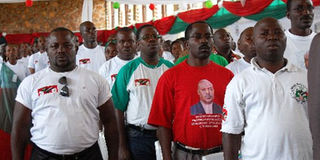Burundi's ruling party youth wing, acting with impunity

Photo taken on April 21, 2012 shows members of the youth league Inbonerakure during a congress meeting in Gitega, Burundi. AFP. They have been accused of becoming a law unto themselves.
What you need to know:
- "They have replaced the judicial authorities and the police and have taken it upon themselves to ensure security, a role on which the defence and security forces are supposed to have a monopoly."
Bujumbura
The tens of thousands of young men from Burundi's ruling party, notorious for their nocturnal "security patrols" countrywide, are increasingly a law unto themselves.
Overcoats draped over their shoulders hide the clubs, machetes and rifles they carry as they patrol towns and villages, checking an identification card here, closing down a bar there.
The youth wing of the ruling Cndd-FDD counts tens of thousands of members who enjoy impunity even as they beat up opponents, run extortion rackets and engage in deadly vendettas.
The Imbonerakure, as the members of the youth wing are known, even also act in broad daylight -- banning opposition meetings, destroying opposition party flags -- under the approving eye of Burundi's police and administration.
"In some parts of the country the Imbonerakure are a law unto themselves," said Vital Nshimirimana, co-ordinator of the civil society coalition Forsc.
"They have replaced the judicial authorities and the police and have taken it upon themselves to ensure security, a role on which the defence and security forces are supposed to have a monopoly."
Nshimirimana, whose Forsc platform groups together more than 200 organisations, was speaking at a press conference earlier this month aimed at kickstarting a "campaign against political intolerance in Burundi."
Forsc slammed "intimidation, kidnappings, assassinations, torture and other abuses" perpetrated notably "by the ruling party youth wing".
Stung by a public outcry over recent blunders committed by the Imbonerakure, the Burundian authorities earlier this month came out in defence of the youth wing.
"I call on you not to use the blunders we have seen to gain a political advantage, for such mistakes are the fault of an individual and should not be held against the movement as a whole," Interior Minister Edouard Nduwimana told civil society groups.
"The Imbonerakure are affiliated to Cndd-FDD and as a general rule they do a very good job in helping maintain order and security," Nduwimana said.
-- Growing role ahead of 2015 elections --
The Imbonerakure have taken on an ever-bigger policing role since the 2010 elections, won by the Cndd-FDD and boycotted by the opposition.
The violence that followed the elections sparked fears that Burundi could sink back into all out civil war.
But the defence and security forces, backed by the Imbonerakure, snuffed out the fledgling rebellions before they got off the ground.
Cndd-FDD has so far refused to say how many men are enrolled in the Imbonerakure, which opponents call a militia group. The group's members are thought to run into the tens of thousands.
"Don't be deceived. There's nothing gratuitous about the Imbonerakure violence," said Frederic Banvuginyumvira, deputy chairman of the Frodebu opposition party.
"It contributes to creating a climate of terror, particularly in the countryside ahead of the 2015 elections, just like what we saw in Ivory Coast."
For him, the fact that the Imbonerakure enjoy impunity backs up the theory that they are part of an election strategy for 2015.
The ruling party dismisses such theories.
"If the Imbonerakure go unpunished, the blame lies with the administrative or judicial officials whose role it is to crack down on abuses but who don't," said Pascal Nyabenda, the chairman of the ruling Cndd-FDD.
"We don't need a militia to get elected. The people love us and they're behind us all the way," he said.
But the officials whose job it would be to crack down on the militia say it is not that simple.
"If you meddle in the affairs of the Imbonerakure you get transferred to the back of beyond," a police officer told AFP. "We have no choice but to turn a blind eye."




